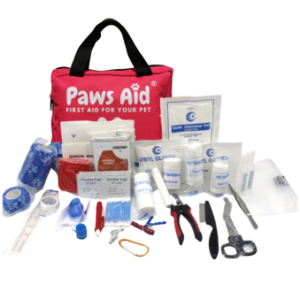Pet First Aid
Pet First Aid By Commander Ronel Du Preez, NEwsletter Staff
 Having a pet first aid kit on hand is crucial for ensuring the well-being of our companions. Just like humans, pets can encounter accidents, injuries. A basic well-equipped pet first aid kit serves as a valuable resource in times of emergencies, allowing pet owners to provide prompt and effective care until professional veterinary help is available. Being prepared with a pet first aid kit not only empowers pet owners to address minor injuries but can also make a significant difference in critical situations, potentially saving a pet’s life by allowing for timely intervention and stabilization.
Having a pet first aid kit on hand is crucial for ensuring the well-being of our companions. Just like humans, pets can encounter accidents, injuries. A basic well-equipped pet first aid kit serves as a valuable resource in times of emergencies, allowing pet owners to provide prompt and effective care until professional veterinary help is available. Being prepared with a pet first aid kit not only empowers pet owners to address minor injuries but can also make a significant difference in critical situations, potentially saving a pet’s life by allowing for timely intervention and stabilization.
- Register all necessary and emergency phone numbers in your phone (Vet, Animal Control, Animal Rescue Centers, etc.)
- Digital Thermometer: Test to make sure that it is still in working order and make sure the batteries are still good.
- Gauze: Is the gauze still clean, sterile and properly wrapped and closed. If not; throw away and get new sterile gauze.
- Tweezers: Make sure these are clean and rust free. It can be used to remove small objects that have penetrated your pet’s skin.
- Medical and vaccination booklet: This must be kept in a plastic, watertight bag to keep it intact. This must be taken with to the vet especially if your pet has any allergies.
- Scissors: Medical scissors can be used for cutting bandages.
- Nitrile gloves (in case of latex allergies.) These gloves must be brand new and never previously used.
- Emergency foil blanket: It can be used in case of hypothermia or shock.
- Absorbent gauze pads: Are they still sealed, clean and sterile? These are used to absorb fluid and or to stop bleeding from a wound or even an open abscess.
- Bandages: Check with your veterinarian about what bandages would be appropriate.
Legal Disclaimer:
Talk to your veterinarian about what is necessary and appropriate for your specific pet.
The information in this Pet First Aid article is for general information purposes only and does not replace professional veterinary advice, diagnosis, or treatment. Pet health and safety can vary based on individual factors. Always consult a qualified veterinarian or animal healthcare professional for advice tailored to your pet’s individual needs. By using this article, you acknowledge that you understand and agree to use the information responsibly alongside professional veterinary guidance.

